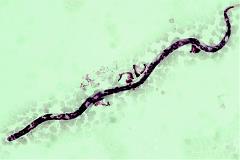Client Communication: Companion Animals, the Risks and Prevention of Heartworm Disease

Found in many parts of the world and transmitted through the bite of a mosquito, heartworms are responsible for the spread of a serious and potentially fatal disease. Companion animals affected by this disease include the dog, cat, and ferret.
Heartworms in Dogs
Of the domestic animals, dogs are a natural host for the parasite, as the canine body offers an environment that is suitable for the heartworm to live, mature, breed, and produce offspring.
- Once a dog becomes infected:
- The heartworm migrates to live within the heart, lungs, and associated blood vessels
- Adult worms can live for 5 to 7 years, causing irreparable damage to the dog’s health
- When left untreated, a typical dog may host around 15 to 30 heartworms, but a severely infested dog may harbor several hundred.
In the later stages of the heartworm infection, the dog may suffer from:
- Severe lung disease
- Heart failure
- Damage to body organs
- Potential death
Heartworms in Cats
The cat, however, is considered to be an atypical host – meaning its body does not offer an environment completely favorable for the heartworm to live its natural life cycle. Clients with cats need to know that while discussions often focus on the effects of heartworms in dogs, the heartworm parasite is fully capable of infecting and damaging the health of their feline pet.
Clients will benefit from learning the following:
- Heartworm transmission in cats follows the same cycle as in dogs
- A mosquito bites an infected carrier animal and then bites an uninfected cat, and the cat becomes infected
- The atypical host environment of the cat often means that the heartworm is unable to reach its adult stage; but typically an infected cat will have one to three adult heartworms, each capable of surviving for up to 2 to 3 years
- The smaller number of adult worms make a diagnosis of heartworm infection more difficult to detect in cats
- Damage to a dog’s health is caused by the adult heartworm; however, it is the immature stage of the heartworm that causes the serious, and sometimes deadly, feline disease referred to as HARD (heartworm associated respiratory disease)
When a cat presents with heartworm disease symptoms it is often a sign that the disease has reached its advanced stage. However, sometimes the progress of the disease is very subtle. In these cases, the first sign of heartworm disease may occur when the cat collapses or suddenly dies.
Common signs of heartworm disease in a cat may include:
- Coughing
- Asthma-like attacks
- Periodic vomiting
- Loss of appetite
- Weight loss
- Difficulty walking
- Fainting or seizures
- Extended abdomen, caused by fluid build-up
Need Regulatory Assistance
If you need help with regulatory or licensing issues, we're happy to help. We have a wide variety of resources to help you when issues arise.

Careers
Are you looking for a place to let your talents shine? At Covetrus, we help our practitioner customers better serve their patients and take pride in providing the best customer experience possible. Search our open positions to see our available opportunities.
Newsletter
Stay current with what’s going on with Covetrus, subscribe to receive our newsletter and email communications. Subscribers will receive the latest information in practice management, sales and marketing, animal health, and more.


Leave a comment